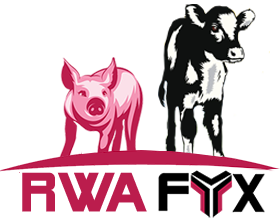HYPER-EGG® is a registered Trade-Mark of J. H. Hare & Associates Ltd.
Egg Antibodies in prevention of diarrhea
Improvement of Growth performance in piglets after Feeding Nursery diet supplemented with HYPER-EGG K88® and infecting piglets with ETEC K-88 bacteria
Study performed: University of Minnesota
Number of piglets used in the study: Thirty 18-day old piglets and six were in each group.
Feeding regimen: Each group were fed nursery diet supplemented with EG, (4Kg control egg powder from unimmunized group/T of feed), or ABEG 0.2%, (2Kg HYPER-EGG K88®/T of feed), or ABEG 0.4% (4Kg HYPER-EGG K88®/T of feed), or ABDEX 0.2% (1Kg of HYPER-EGG K88® + 1Kg Dextrose/T of feed), or ABDEX 0.4% (2Kg of HYPER-EGG K88®+ 2Kg Dextrose/T of feed), for 14 days, from day 1 to day 14, post-weaning. Piglets were fed normal diet during day 14-28.
Infection with ETEC K88: All piglets were infected orally on day 7 post-feeding with 1012 CFU of ETEC K88. • Study parameters: Clinical response (incidence of diarrhea, severity of diarrhea, enumeration of ETEC K88 from rectal swab) and changes in growth performance (body weight changes, ADG and ADFI).
Feeding nursery diet supplementing with HYPER-EGG K88® resulted in:
Incidence of diarrhea and severity of diarrhea were reduced in all the four groups of HYPER-EGG K88®fed piglets, compared to the controls, which were fed egg powder prepared from unimmunized chickens.
However, the statistically significant difference was achieved in two test groups: ABEG 0.4% (4Kg HYPER-EGG® K88 /T of feed) and ABDEX 0.4% (2Kg of HYPER-EGG K88®+ +2Kg Dextrose/T of feed).
Growth improvement was achieved in all the test groups, which were fed with HYPER-EGG K88®, compared to the controls.
However, the statistically significant difference (p The body weight was increased in all the three test groups on day 10, day14 and day 28. On day 28, the increase of body weight in piglets of the three test groups ranged from 1.7 – 2.5kg, over the control group. Overall, the increase ranged from 13-20% over the control group.
It has been confirmed in the experimental study performed at the University of Minnesota, that feeding piglets with nursery diet supplemented with HYPER-EGG K88®antibody products from day1 to day14 post-weaning and infected with lethal dose of ETEC K88 on day 7 post feeding, prevented from getting diarrhea, reducing in severity of diarrhea, and improving their growth performance. Although, feeding piglets with all four doses of HYPER-EGG K88®antibody products significantly reduces the severity of diarrhea, however, the statistically significant difference in preventing diarrhea was observed with only two diet formulations, with 0.4% ABEG (4Kg of HYPER-EGG K88®/T of feed) and 0.4% ABDEX (2 Kg of HYPER-EGG K88®+ 2Kg Dextrose/T of feed). In 1st week post feeding, piglets from the control group (fed with 4Kg of control egg powder from unimmunized egg /T of feed) grew similar to the pigs of the four HYPER-EGG K88®fed test groups, 0.2% or 0.4% ABEG, (2Kg or 4Kg HYPER-EGG K88®, /T of feed) or 0.2% or 0.4% ABDEX (1Kg or 2Kg HYPER-EGG K88® + 1 Kg or 2Kg Dextrose/T of feed). At day 7, all pigs were infected with 1012 CFU of ETEC K88. During three days post-infection, most of pigs’ growth rates were reduced numerically, especially for pigs fed control diet. During 4-7 days post- infection, pigs recovered in terms of ADG, except pigs fed control diet (egg powder from non-immunized chicken) and 0.2% ABDEX diet (0.1% HYPER-EGG K88® antibody egg powder + 0.1% dextrose). Overall, during 1st week post-infection, pigs fed 0.4% ABEG diets (0.4% antibody egg powder – HYPER-EGG K88®) and 0.4% ABDEX (0.2% antibody egg powder + 0.2% dextrose) had greater ADG compared to pigs fed control diet, and numerically greater than 0.2% ABDEX diet (0.1% antibody egg powder). For period of week 1 and 2, pigs fed 0.4% ABDEX and 0.4% ABEG diet had greater ADG, ADFI and feed efficiency compared to pigs fed other diets. In week 3 and 4, pigs were switched to Phase 2 nursery diets without any supplements. The results are illustrated in Table 1 and Figure 1.
The increase in body weight was higher in the test groups than the control group, on day 10, 14, and 28, except for group 3 with Eggstend 0.2% (0.1% antibody egg powder + dextrose). On day 28, the increase of body weight in piglets of the three test groups ranged from 1.7 – 2.5kg, over the control group, and the difference was statistically significant. Overall, the increase ranged from 13-20% over the control group. There was a slight increase in body weight in piglets fed diet 3, compared to the control diet, but the difference was not significant.
Home
